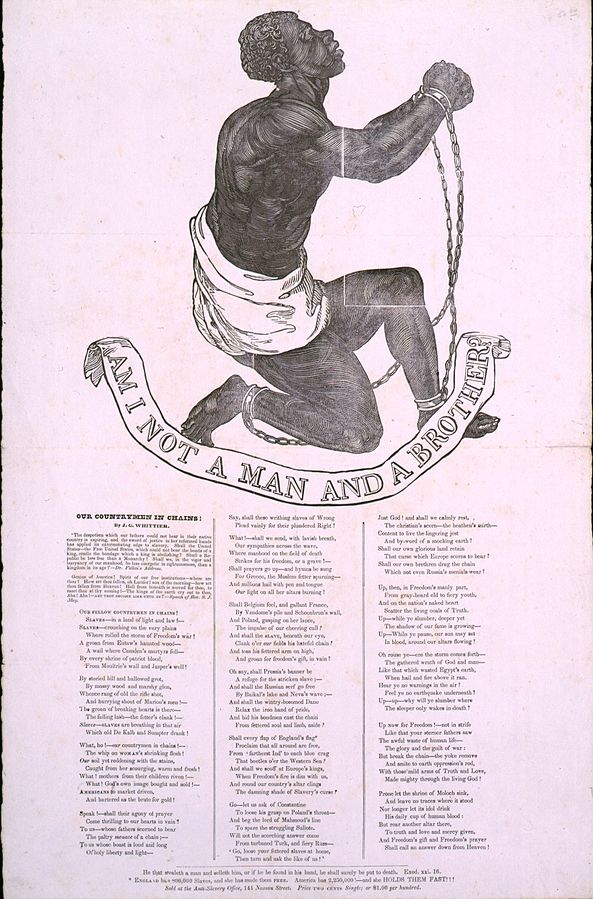This text is part of the Teaching Hard History Text Library and aligns with Key Concept 8.

OUR COUNTRYMEN IN CHAINS!
By J.G. WHITTIER.
The despotism which our fathers could not bear in their native country is expiring, and the sword of justice in her reformed hands has applied its exterminating edge to slavery. Shall the United States—the Free United States, which could not bear the bonds of a king, cradle the bondage which a king is abolishing? Shall a Republic be less free than a Monarchy? Shall we, in the vigor and buoyancy of our manhood, be less energetic in righteousness, than a kingdom in its age?—Dr. Follen’s Address.
Genius of America! Spirit of our free institutions!—where art thou? How art thou fallen, oh Lucifer! son of the morning—how art thou fallen from Heaven! Hell from beneath is moved for thee, to meet thee at thy coming!—The kings of the earth cry out to thee, Aha! Aha!—Art thou become like unto us?—Speech of Rev. S.J. May.
OUR FELLOW COUNTRYMEN IN CHAINS!
Slaves—in a land of light and law!—
SLAVES—crouching on the very plains
Where rolled the storm of Freedom’s war!
A groan from Eutaw’s haunted wood—
A wail where Camden’s martyrs fell—
By every shrine of patriot blood,
From Moultrie’s wall and Jasper’s well!
By storied hill and hallowed grot,
By mossy wood and marshy glen,
Whence rang of old the rifle shot,
And hurrying shout of Marion’s men!—
The groan of breaking hearts is there—
The falling lash—the fetter’s clank!—
Slaves—SLAVES are breathing in that air
Which old De Kalb and Sumter drank!
What, ho!—our countrymen in chains!—
The whip on WOMAN’S shrinking flesh!
Our soil yet reddening with the stains,
Caught from her scourging, warm and fresh!
What! mothers from their children riven!—
What! God’s own image bought and sold!—
AMERICANS to market driven,
And bartered as the brute for gold!
Speak!—shall their agony of prayer
Come thrilling to our hearts in vain!
To us—whose fathers scorned to bear
The paltry menace of a chain;—
To us whose boast is loud and long
Of holy liberty and light—
Say, shall these writhing slaves of Wrong
Plead vainly for their plundered Right?
What!—shall we send, with lavish breath,
Our sympathies across the wave,
Where manhood on the field of death
Strikes for his freedom, or a grave!—
Shall prayers go up—and hymns be sung
For Greece, the Moslem fetter spurning—
And millions hail with pen and tongue
Our light on all her altars burning?
Shall Belgium feel, and gallant France,
By Vendome’s pile and Schoenbrun’s wall,
And Poland, gasping on her lance,
The impulse of our cheering call?
And shall the SLAVE, beneath our eye,
Clank o’er our fields his hateful chain?
And toss his fettered arm on high,
And groan for freedom’s gift, in vain?
Oh, say, shall Prussia’s banner be
A refuge for the stricken slave?—
And shall the Russian serf go free
By Baikal’s lake and Neva’s wave?—
And shall the wintry-bosomed Dane
Relax the iron hand of pride,
And bid his bondmen cast the chain
From fettered soul and limb aside?
Shall every flap of England’s flag
Proclaim that all around are free,
From ‘farthest Ind’ to each blue crag
That beetles o’er the Western Sea?
And shall we scoff at Europe’s kings,
When Freedom’s fire is dim with us,
And round our country’s altar clings
The damning shade of Slavery’s curse?
Go—let us ask of Constantine
To loose his grasp on Poland’s throat—
And beg the lord of Mahmoud’s line
To spare the struggling Suliote.
Will not the scorching answer come
From turbaned Turk, and scornful Russ—
‘Go, loose your lettered slaves at home,
Then turn and ask the like of us!’
Just God! and shall we calmly rest,
The christian’s scorn—the heathen’s mirth—
Content to live the lingering jest
And by-word of a mocking earth?
Shall our own glorious land retain
That curse which Europe scorns to bear?
Shall our own brethren drag the chain
Which not even Russia’s menials wear?
Up, then, in Freedom’s manly part,
From graybeard eld to fiery youth,
And on the nation’s naked heart
Scatter the living coals of Truth,
Up—while ye slumber, deeper yet
The shadow of our fame is growing—
Up—While ye pause, our sun may set
In blood, around our altars flowing!
Oh rouse ye—ere the storm comes forth—
The gathered wrath of God and man—
Like that which wasted Egypt’s earth,
When hail and fire above it ran.
Hear ye no warnings in the air?
Feel ye no earthquake underneath?
Up—up—why will ye slumber where
The sleeper only wakes in death?
Up now for Freedom!—not in strife
Like that your sterner fathers saw
The awful waste of human life—
The glory and the guilt of war:
But break the chain—the yoke remove
And smite to earth Oppression’s rod,
With those mild arms of Truth and Love,
Made mighty through the living God!
Prone let the shrine of Moloch sink,
And leave no traces where it stood;
Nor longer let its idol drink
His daily cup of human blood;
But rear another altar there,
To truth and love and mercy given,
And Freedom’s gift, and Freedom’s prayer
Shall call an answer down from Heaven!
[footer text]
He that stealeth a man and selleth him, or if he be found in his hand, he shall surely be put to death. Exod. xxi. 16.
* ENGLAND has 800,000 Slaves, and she has made them FREE. America has 2,250,000!—and she HOLDS THEM FAST!!!